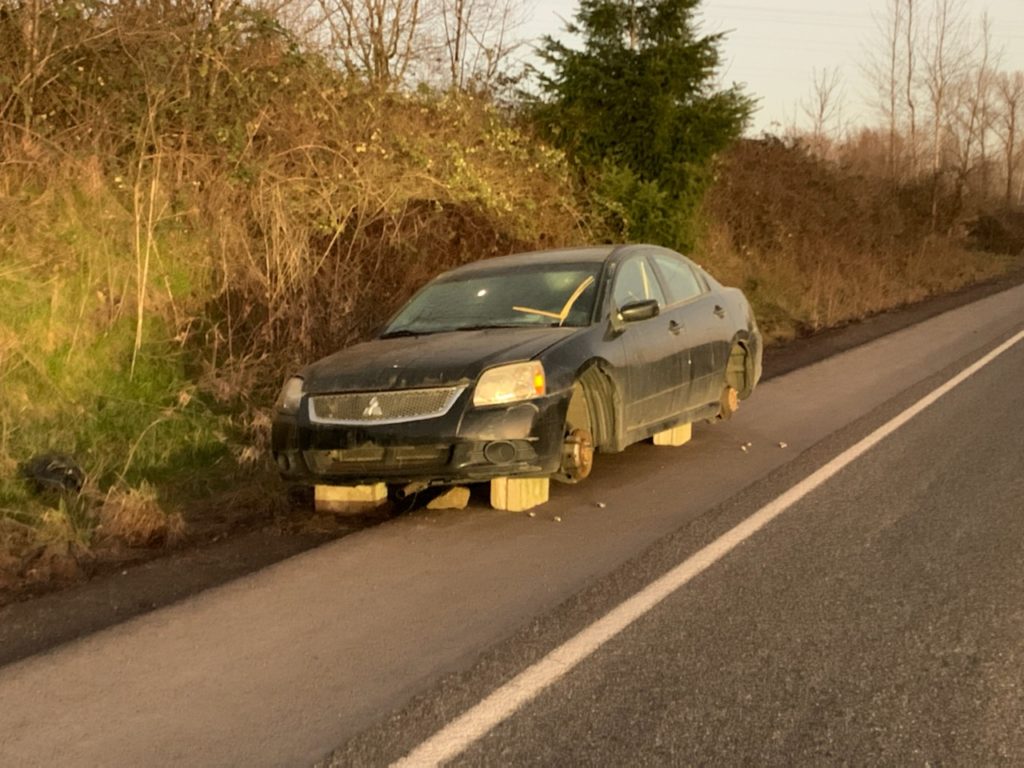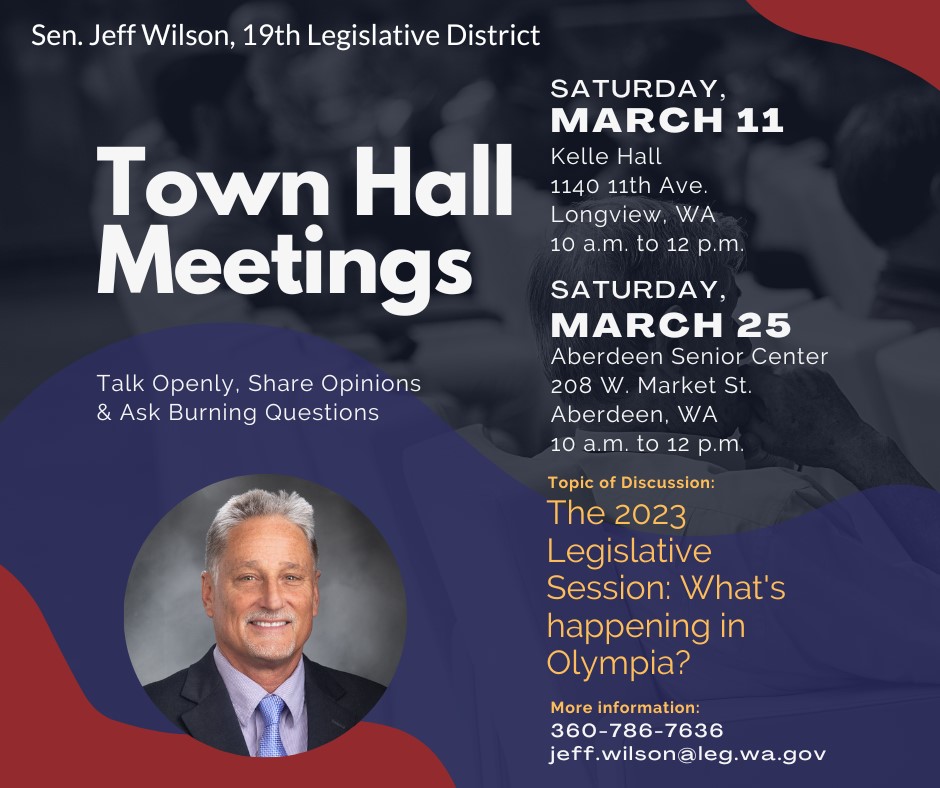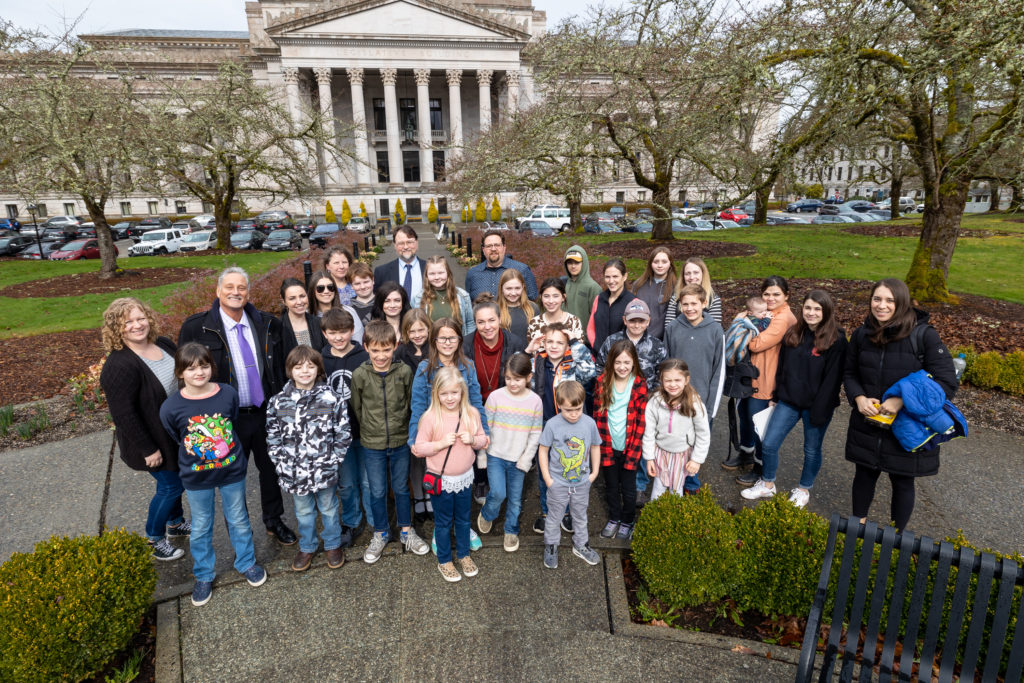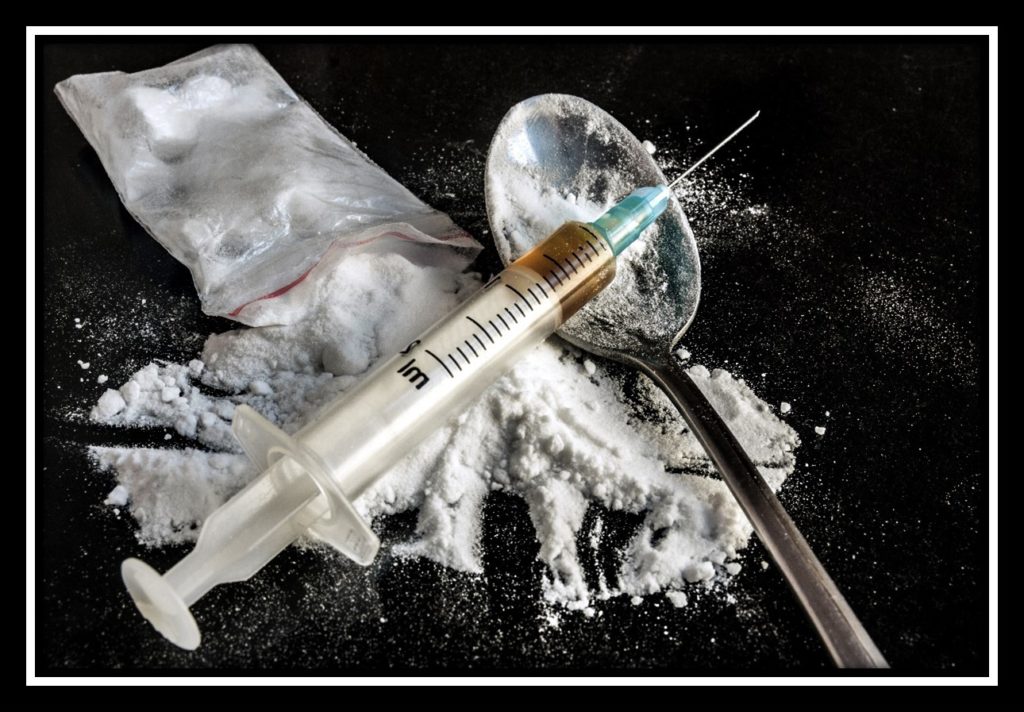Note: The following e-newsletter was sent to Sen. Wilson’s subscribers March 6, 2023. To subscribe to Sen. Wilson’s e-newsletters, click here.
Live and in person!
Crime is hot topic in Legislature as action moves to the House and Senate floors
Dear friends and neighbors,
We’ve reached the midway point of our 2023 legislative session – a great time to talk about what’s happening in Olympia. We have a pretty good handle on the big debates of the year. Some of them have already begun, now that we are taking votes on the House and Senate floors on some of the most controversial bills of the session.
I’ll tell you about them this Saturday at a town hall meeting in Longview. If you can’t make that one, we will have another March 25 in Aberdeen. I hope you can be there. There’s plenty for us to talk about, and you’ll have a chance to say your piece.
I expect many of you will have strong opinions on crime, drugs, and the serious problems that have emerged with the anti-police bills passed by the Legislature two years ago. I’m with you there. But there also is good news to report, including exciting developments on legislation to crack down on catalytic converter theft. If you are in the Longview or Aberdeen area, please make a note on your calendar about these town hall meetings. I want to hear what you think.
Sen. Jeff Wilson, 19th Legislative District
Home school district days
Last Friday, I hosted the first of my “Home School District Days” — a series of visits from homeschoolers interested in seeing the Legislature at work. On this first visit, I had the honor of meeting students and parents from the Classical Conversations Co-op. We will have five more of these visits this session, from kids across the 19th District. I can’t wait!
A few spots are still available for the sixth Home School District Day on April 18th. Register by adding your household at this registration page.
Police pursuit bill up in the air, faces Wednesday deadline
If the uptick in crime statewide these last two years wasn’t enough, two incidents last week demonstrate the urgent need to fix our police-pursuit law.
- On Tuesday night, a motorist was clocked doing 110 mph near Ellensburg on Interstate 90, but failed to pull over for a Washington State Patrol officer. Because of restrictions on police pursuits passed two years ago, a speeding infraction was not sufficient for the police to give chase. Two hours later, police say the same motorist entered I-82 near Sunnyside – driving the wrong direction. He smacked head-on into another vehicle, killing two passengers, a 6-year-old boy and an 8-year-old girl.
- On Friday morning, a gang used a truck to smash into a Lakewood credit union. They chained up an ATM, used the truck to yank it out of the building, and dragged the ATM down the street. Police heard the loud scraping noise, and one officer was able to catch up and get close enough to take down a plate number. The chain broke at an intersection and the truck took off. Because this was a property crime, police could not pursue.
You have the Legislature to thank for absurd and tragic stories like these. Two years ago, our Democratic colleagues at the statehouse decided to take the side of political activists and protesters who believe cops are the enemy and need to be reined in. The result was a series of bills that made it easier to send law enforcement officers to jail for doing their job, and sharply restricted police weapons and tactics. Some of this we have managed to fix. Our pursuit law, we haven’t.
Today criminals are thumbing their noses at police. WSP tells us car thefts are up 50 percent, and the number of cases where pursuit would have been justified under the old law have nearly tripled, from 1,200 to 3,100 annually. There is broad bipartisan support to bring back the old law and allow police to pursue based on “reasonable suspicion.” Yet there is strong political opposition on the other side of the aisle. Our colleagues killed a Senate bill, and while a watered-down House version survives at this point, no vote has yet occurred on the House floor and the deadline is Wednesday. The clock is ticking.
A new “Blake fix” partially restores drug penalties
Big problems with our drug laws are another legacy of our soft-on-crime session of two years ago. The Supreme Court threw out our felony statutes against possession of hard drugs like heroin, meth and fentanyl, on a technicality we might easily have fixed. Instead, our colleagues decided to make hard-drug possession a barely enforceable misdemeanor. Today this misguided act of “compassion” has resulted in an explosion of overdose deaths, and it is a contributing factor in the rise of robbery, burglary and other property crime.
On Friday, I wound up voting for a compromise bill that goes nowhere near far enough. Senate Bill 5536 raises possession to a gross misdemeanor and makes it somewhat more likely that law enforcement and courts will force addicts into the treatment they need. I wish legislative politics would allow us to restore felony penalties. I wish we had adequate treatment options for all who need them, and tough laws to force behavioral changes. But this compromise was better than nothing. If we take no action by July 1, our drug laws expire entirely. This issue likely will remain in play through the end of session – stay tuned.
In the news:
Good news for crackdown on catalytic converter theft
In my last newsletter, I reported my disappointment at the death of my bill this year to crack down on skyrocketing catalytic converter theft. Since then, its health has greatly improved. Lawmakers on both sides agree something must be done — and when that happens, dead bills have a mysterious way of coming back to life. Now it’s a matter of establishing parameters for the compromise. I laid out it out in a guest editorial published in Sunday’s Tri-City Herald.
Catalytic converter theft in WA state is organized crime, so let’s treat it that way
 As the Washington Legislature debated the catalytic converter bill last session, someone parked this car across the street from my house in Longview. Within days, thieves had it up on blocks, the wheels were stripped and the catalytic converter was lopped off the tailpipe. It was as if someone was trying to send me a message – don’t give up on the bill. Courtesy photo by Sen. Jeff Wilson, R-Longview.
As the Washington Legislature debated the catalytic converter bill last session, someone parked this car across the street from my house in Longview. Within days, thieves had it up on blocks, the wheels were stripped and the catalytic converter was lopped off the tailpipe. It was as if someone was trying to send me a message – don’t give up on the bill. Courtesy photo by Sen. Jeff Wilson, R-Longview.
BY SEN. JEFF WILSON, R-LONGVIEW
When workers in the Woodland School District showed up early on the morning of Jan. 23, they heard power saws in the bus parking lot. The thieves heard them coming and scattered, dropping their tools and a few of the catalytic converters they had lopped from school-bus tailpipes. They all got away. They always do.
This was the fourth time the district had been hit. The previous time, the district installed hardened-steel cages underneath its school buses, to shield the valuable converters. The thieves sawed right through them. They did a total $24,000 damage.
We are hearing stories like this everywhere — from school districts in every part of the state, from apartment dwellers in Redmond, shoppers in downtown Longview and people who stall along the shoulder of I-182 in the Tri-Cities. Washington has become a national leader in our country’s epidemic of catalytic converter theft, with about 4,000 reported cases in 2021. That was enough to rank us Number Three, according to the National Insurance Crime Bureau — and we may score higher when 2022 numbers are released.
There really is something we can do about it. It begins by recognizing catalytic converter theft is an organized crime. The chain starts with the petty thief who climbs under your car with a power saw. Then someone has to buy what he steals, someone has to “de-can” the catalytic converters, and someone has to get them to the recycler who strips and resells the precious metals and reaps the final reward.
Law enforcement tells us these criminal supply chains appear to be especially strong in the Pacific Coast states, some feeding recyclers in the eastern part of the country. The state of Oregon has broken several of these networks, busting ringleaders and putting heat at the top. Washington should do the same.
That’s why I am sponsoring Senate Bill 5740, which creates a new Class B felony, trafficking in stolen catalytic converters. Anyone who knowingly traffics in stolen converters, and purchases five or more used catalytic converters without a scrap dealer’s license, could receive a prison sentence up to 7 years.
For all the argument we have had in the Legislature these last two years about public safety and law enforcement, I think Republicans and Democrats can reach agreement on catalytic converters. We know we won’t get far merely by dealing with the thief who wields the saw. We need to look further up the chain, at those who drive these crimes with shadowy cash-for-converters transactions. I have been impressed by the pledges of cooperation and support I am hearing from my colleagues — this is truly a bipartisan issue.
Getting at the criminal supply chain has been my idea ever since I introduced Washington’s first bill on catalytic converter theft in December 2021. My initial goal was to prevent stolen converters from entering our state’s legal scrap metal recycling channels. We made progress last year with House Bill 1815, which prohibits scrap dealers from making cash payments on the spot, and requires photo ID and meticulous record-keeping.
We also came up with a plan for law enforcement involvement at high levels — funding for local-police sting operations, expansion of the state’s “no-buy database” of suspected metal thieves, and development of a comprehensive strategy against metal theft. Sadly, these priorities were not funded in last year’s budget, but I am working for a $2.2 million appropriation for these purposes this year.
Right now, there also is discussion of a state program to etch vehicle ID numbers into catalytic converters. This plan leaves me cold, as this merely allows us to track crime, not prevent it. But as long as this comes in addition to a strategy involving law enforcement, and doesn’t replace it, I see no harm.
I think about the impact this crime has on all of us in this state, from the special-ed kids in the Woodland School District who couldn’t get to school because their wheelchair-lift buses were in the shop, to the working people who start their cars in the morning, hear a blast from the tailpipe, and face a repair bill of $1,000 or more. In the final weeks of the 2023 session, I think we will see quite a bit of activity on this issue — and I hope the people will hold us to it.
Sen. Jeff Wilson, R-Longview, represents the 19th Legislative District.
Bills in progress
In recent days, several bills I sponsored have won passage in the Senate and have advanced to the House. They are:
Senate Bill 5595 – declaring Washington’s nickname to be “The Evergreen State,” and correcting a 130-year-old mistake. The Legislature’s vote in 1893 apparently was never recorded. Read more here.
Senate Bill 5023 – allowing tow-truck operators to use rear-facing blue flashers for safety, a measure prompted by a pair of deadly accidents on Interstate 5 in Southwest Washington. Read more here.
Senate Bill 5542 – combatting EV charger destruction by requiring extra scrutiny by scrap dealers when charger cords and other parts are brought in for recycling. Read more here.
Senate Bill 5287 – holding green energy to green standards, by launching a study by Washington State University of recycling options for used wind blades – which now are sent to landfills when their 20-year service life is complete. Read more here.
Senate Bill 5436 — clears up a glitch in Washington’s gun-transfer law, allowing museums to accept and display firearms without undergoing a criminal background check. That’s an impossibility for a museum — because, after all, museums aren’t people and have no criminal histories that can be checked. Read more here.
Contact me!
Telephone: (360) 786-7636
Email: Jeff.Wilson@leg.wa.gov
Mailing address: P.O. Box 40419 /Olympia, WA 98504
Leave a message on the Legislative Hotline: 1-800-562-6000
To unsubscribe from these regular updates from Olympia, go to the Subscriber Preferences Page below.












